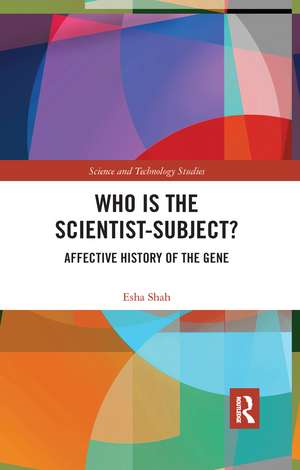Who is the Scientist-Subject?: Affective History of the Gene: Science and Technology Studies
Autor Esha Shahen Limba Engleză Paperback – 18 dec 2020
The author covers a century-long history of the concept of the gene as a series of "pioneering moments" through an engagement with life-writings of eminent scientists to show how their ways of being and belonging relate with the making of the science. The scientist-self is theorized as fundamentally a feeling, experiencing, and suffering subject split between the conscious and unconscious and constitutive of personality aspects that are emotional/psychological, "situated" (cultural and ideological), metaphysical, intersubjective, and existential at the same time.
An engaging interdisciplinary interpretation of the dominance of reductionism in genetic science, this book will be of major interest to scholars and researchers of science, history, and philosophy alike.
| Toate formatele și edițiile | Preț | Express |
|---|---|---|
| Paperback (1) | 381.43 lei 6-8 săpt. | |
| Taylor & Francis – 18 dec 2020 | 381.43 lei 6-8 săpt. | |
| Hardback (1) | 762.16 lei 6-8 săpt. | |
| Taylor & Francis – 18 mai 2018 | 762.16 lei 6-8 săpt. |
Preț: 381.43 lei
Nou
Puncte Express: 572
Preț estimativ în valută:
72.98€ • 76.21$ • 60.27£
72.98€ • 76.21$ • 60.27£
Carte tipărită la comandă
Livrare economică 15-29 aprilie
Preluare comenzi: 021 569.72.76
Specificații
ISBN-13: 9780367734435
ISBN-10: 0367734435
Pagini: 188
Dimensiuni: 138 x 216 x 8 mm
Greutate: 0.26 kg
Ediția:1
Editura: Taylor & Francis
Colecția Routledge India
Seria Science and Technology Studies
Locul publicării:Oxford, United Kingdom
ISBN-10: 0367734435
Pagini: 188
Dimensiuni: 138 x 216 x 8 mm
Greutate: 0.26 kg
Ediția:1
Editura: Taylor & Francis
Colecția Routledge India
Seria Science and Technology Studies
Locul publicării:Oxford, United Kingdom
Public țintă
PostgraduateCuprins
1. Introduction: Affective History of the Gene 2. Who is the Scientist-Subject? A Critique of the Neo-Kantian Scientist-Subject in Lorraine Daston and Peter Galison’s Objectivity 3. Immortality Ideologies and the Particulate Gene: H. J. Muller 4. What is Life? Placed in Erwin Schrodinger’s Life 5. The Myth and Truth of Barbara McClintock 6. Rosalind Franklin and her Science-in-the-making: A Situated, Sexual and Existential Portrait 7. The Ultra-Contemporary Self and Hyper-Reductionism of Human Genome Science: Craig Venter 8. Conclusion
Notă biografică
Esha Shah is an environmental engineer by training and a social anthropologist, historian, and philosopher of science and technology by professional choice. She is Assistant Professor with the Department of Environmental Sciences at Wageningen University, the Netherlands.
Her research interests so far have broadly concerned the history and anthropology of technology-led development in India on the divide of modernity and democracy. With this book, her research interests have expanded to philosophy of subjectivity and its relation to modes of rationality, including objectivity in science.
Her research interests so far have broadly concerned the history and anthropology of technology-led development in India on the divide of modernity and democracy. With this book, her research interests have expanded to philosophy of subjectivity and its relation to modes of rationality, including objectivity in science.
Recenzii
"Esha Shah richly demonstrates how the 'ways of being and belonging' affect the 'structures' of rational cognition and how the method and philosophy of reductionism stand determined by 'affective' scientific self. Drawing widely on the history of science, auto/biographies, psychoanalysis, and metaphysics, she shows how preference for unity and order, fascination for immortality, and love of complexity have shaped the scientific estate. The bonds of love often overcome the hegemony of gene. This is an incredible feat of feminist social epistemology and a sustained provocation to historiographical doxa." Upendra Baxi, Emeritus Professor of Law, University of Warwick, UK, and University of Delhi, India
Descriere
This book explores two disparate sets of debates in the history and philosophy of the life sciences: the history of subjectivity in shaping objective science and the history of dominance of reductionism in molecular biology. It will be of major interest to scholars and researchers of science, history and philosophy alike.





